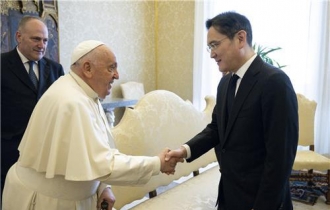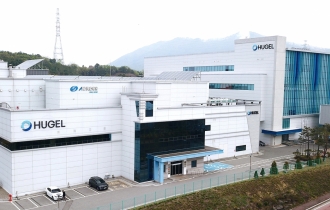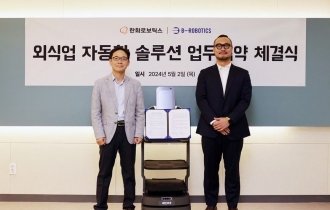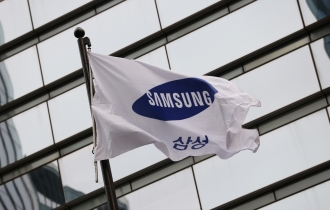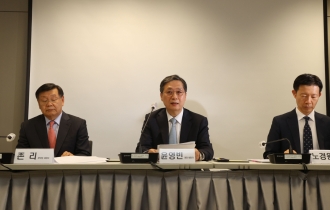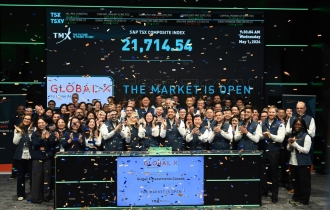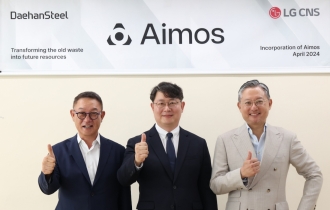[Herald Interview] Bridging Korea, Philippines for better future

Luis Chavit Singson (right), chairman of the Philippines’ LCS Group of Companies, and iconic boxer Manny Pacquiao hold hands before an interview with The Korea Herald at a Seoul hotel on Tuesday. (Lee Sang-sub/The Korea Herald)
Building bilateral ties between Korea and the Philippines could be a means to boosting the livelihoods of the people of each country for Luis Chavit Singson, chairman of the Philippines’ LCS Group of Companies, and boxing legend Manny Pacquiao.
Singson and Pacquiao, longtime friends and investment partners, visited Seoul this week in a search for new business opportunities, along with Secretary of Agrarian Reform Conrado Estrella. Over the years, the two have been highly interested in cooperating with Korea, seeing the country as an appropriate business partner for the Philippines.
One of the key investments underway is manpower exchange for cosmetics manufacturing. On Monday, Singson and Pacquiao met with Incheon Mayor Yoo Jeong-bok to discuss cooperation.
“Korean beauty products are very good and popular in the Philippines,” Singson, a former governor of Ilocos Sur province, said in an interview with The Korea Herald at a hotel in central Seoul on Tuesday.
The duo is to team up with the Philippines’ labor training institution, the Technical Education and Skills Development Authority, in hopes of sending skilled Filipino workers to Korea for them to be trained at a cosmetics manufacturing complex in the Incheon Free Economic Zone.
The labor exchange could be expanded to other sectors in the future, said Singson, who heads LCS Group with businesses spanning from real estate and mining to aviation.
“In the future, we can develop and strengthen our relationship between the Philippines and Korea and we can exchange manpower and vice versa. If we are going to bring the Philippines here to work then we can also bring Korean people to work in the Philippines,” he explained.
Singson has also worked with Korea to provide electric vehicles in the Southeast Asian country.
“The major purpose of our trip here is about (bringing in) electric vehicles to the Philippines,” Singson said, referring to the country's directive to modernize its iconic mode of public transport, the jeepney.
While the Filipino government has been pushing to replace the worn-out, high-polluting, diesel-powered vehicles with new eco-friendly minibuses, the cost has remained a hurdle for the transition.
“We now have partners in Korea to develop the modernization program, by building electric vehicles in Korea to provide to our drivers, which they can afford,” Singson said.
Under the scheme, provincial governments are to vouch for the drivers, providing the vehicles without any down payment or guarantee, he explained.
With the vision to ameliorate the transportation infrastructure in the Philippines, a country of more than 7,000 islands, Singson’s latest project has been the commercialization of wing-in-ground craft.
“We are now developing the prototype for the wing-in-ground craft here,” he said.
“It is like maintaining a car (so the cost will be cheap). The advantages of wing-in-ground crafts are low maintenance, no need for an airport and short takeoff because it could land on the water, snow, grass or sand.”
He projects a prototype to roll out within this year.
Singson and Pacquiao both suggested that Korean businesses venture out to the renewable energy market in the Philippines.
“Electricity is very expensive in the Philippines,” Singson said.
The Philippines has recently allowed full foreign ownership in the renewable energy sector in an attempt to boost investments in the power sector, including solar, wind, biomass, ocean and tidal energy.
Singson and Pacquiao view Korea to be an optimal partner for the Philippines, as the two countries are close in terms of geography and culture. The distance is not far, and the people of the Philippines favor Korea’s showbiz.
“The people of the Philippines and Korea have a good relationship, so it is easy to coordinate and (the two countries are) not too far from each other,” boxer-turned-politician Pacquiao said.
But the two stressed that the main focus of their investment business will be on improving the livelihoods of Filipinos, rather than only pursuing short-term profits.
“The objective is to help the people in the Philippines. That is why we are here to invest,” Pacquiao said.
By Im Eun-byel (silverstar@heraldcorp.com)
The Korea Herald
EDITOR'S PICKS
- Samsung chief returns from Europe after meeting with Pope, business leaders
- Hugel to develop next-generation botulinum toxin product
- B-Robotics teams up with Hanwha Robotics for restaurant automation
- Samsung Life Science Fund invests in US gene therapy firm
- Hyundai Motor aims to lead hydrogen truck business in US
- KASA chief vows full support for private-led space missions
- Global X Canada debuts as Mirae Asset aims unified global ETF brand
- LG CNS enters steel scrap market






